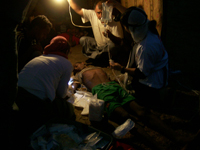Doctors Without Borders Teams Assisting Survivors of Journey in Smuggler Boats
November, 1, 2008, Awhar, Yemen --A team from Doctors Without Borders/Médecins Sans Frontières (MSF) assisting refugees in the south of Yemen found 39 dead bodies on the shore between Friday, October 31 and Sunday, November 2.
UPDATE: Twenty-One More Bodies Found on November 2
Doctors Without Borders Teams find a total of 60 bodies on Yemeni shores between Friday, October 31 and Sunday, November 2.
November, 1, 2008, Awhar, Yemen -- A team from Doctors Without Borders/Médecins Sans Frontières (MSF) assisting refugees in the south of Yemen found 39 dead bodies on the shore between Friday, October 31 and Saturday, November 1.
The refugees said they were coming from the port city of Bosasso in Somalia, fleeing from war and extreme poverty. They made the trip on smugglers’ boats in extremely harsh conditions during a two-day trip across the Gulf of Aden.
One of the survivors described the incident to the MSF team:
"While approaching the shore at 8:00 PM, the smugglers noticed some lights on the land. Being afraid to be spotted by the coast guard, they forced us into the sea, even if the water was too deep. Several people did not know how to swim and they drowned." An eight-months pregnant woman was severely wounded by the boat’s propeller after being forced overboard. She suffered four fractures in her leg and was in a critical condition when the MSF team found her.
In another incident a few hours later, the team discovered a group of Somalis and Ethiopians that had been on the shore for several hours trying to recover after their boat capsized. They said they had to immediately bury 23 of their dead co-passengers. When the MSF team arrived there were still survivors in the capsized boat.
Saïd, a local MSF staff member, described the scene: "The boat was stuck almost upside down in the sand, not far from the beach. The fishermen were trying to find survivors underneath but they could not. So I had to dive under. I managed to get in the hull and with god’s help we got two women and a man out safe. Unfortunately, two others were already dead."
After being given first aid, food, and relief items on the beach, the refugees were taken to the Ahwar Reception Center, where MSF provides medical assistance and counselling to new arrivals.
Such stories are common on the southern coast of Yemen. More than 32,000 people have attempted the trip since the beginning of 2008, according to the United Nations High Commission for Refugees. Somalis and Ethiopians are fleeing from war and extreme poverty, having no choice but to risk their lives in the sea journey. The conditions of the trip are extremely harsh and the death toll is high; since the beginning of September 2008, at least 114 people were found dead in the region of Abyan. The figure does not include dead bodies washed ashore and buried unannounced by fishermen.
"A lot of attention has been paid lately to tackling the issue of piracy in the waters off the Horn of Africa," said MSF Head of Mission in Yemen, Francis Coteur. "Unfortunately, little attention is paid to the drama of the refugees crossing the same waters in horrific conditions. Much more needs to be done to address this issue."
MSF began its project in southern Yemen in September 2007, providing medical and humanitarian assistance to refugees and migrants arriving on the beaches in the Abyan and Shabwa Governorates. During 2008, MSF has provided assistance to over 7,000 people.
In June 2008, MSF released a report, titled "No Choice," which documents the conditions of the perilous journey to Yemen and calls for increased assistance for the thousands of refugees, asylum seekers, and migrants fleeing their home countries.






